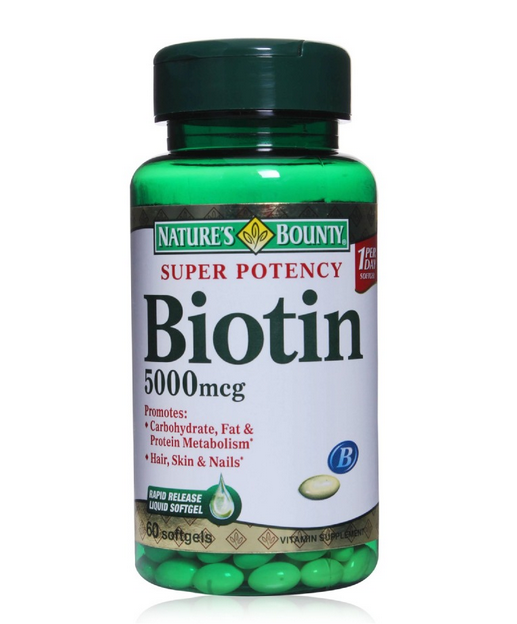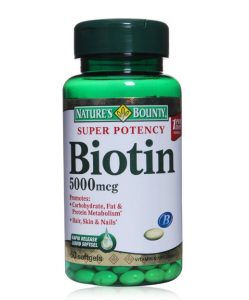Also known as vitamin H or vitamin B7, biotin is an important vitamin that plays an essential role in the maintenance of amino acids and fats as well as cells growth and fatty acids production. It is also instrumental in the creation of biochemical energy at the time of aerobic respiration, promotion of nail and skin health, and regulation of blood sugar levels. Biotin is thought to reduce hair fall and promote hair growth.
The water soluble vitamin naturally occurs in foods such as carrots, tomatoes, almonds, chard, eggs, chicken, strawberries, cabbage, walnuts, oats, and cow milk. Intestinal bacteria also make biotin.
Biotin and its effects on hair growth
The relation between hair growth and biotin is well known and a continual subject of research. Biotin has several benefits, but is most popular due to its effect on the rate of hair growth. The vitamin not only facilitates the growth of hair at a good rate, but also ensure that dry hair does not occur. Amongst all the hair vitamins, biotin is considered to be the most useful as it prevents hair breakage and hair loss by enhancing the sustenance of the hair cortex.Biotin also promotes the well-being of hair by aiding the division of cells present in the hair bulb; this allows the development of new and healthy cells that increase the hair thickness as well as help it grow to its full extent.
It is known that biotin deficiency results in hair loss and skin problems. Hence, studies were carried out to check the relation between biotin and hair growth. It is also one of the reasons why doctors recommend biotin supplements and increased intake of biotin via diet changes to patients suffering from biotin deficiency.
Currently there are many hair and skin care products that contain biotin. It may however be noted that the skin does not absorb biotin. Hence, such products may not yield the desired results. On the other hand, biotin supplements are known to work, especially in people with deficiencies of this vitamin. But then again, biotin deficiency is not the only cause of hair fall or varied skin problems.
It has been claimed that biotin is very effective in reducing and preventing hair thinning, hair breakage, and hair loss as well as enhancing the elasticity of hair. However, the effects of varied biotin products, including biotin supplements, on hair growth is still a matter of debate and research.
Some have even stated that biotin products stimulate the growth of facial hair. But this claim has not been validated by any scientific study as yet.
Dosage of biotin supplements
Individuals who are suffering from biotin deficiency, with or without hair fall, will be prescribed biotin supplements by doctors. In such cases, as is with most cases, biotin supplements use may or may not help resolve hair fall issues or promote hair growth.
Doctors will prescribe biotin dose as per the age, height, gender, weight, and overall health of the patient. They may also take other factors into account before writing down the prescription. Usually, adults and teens are given a daily dose of 30 to 100 mg of biotin supplements; 20 to 25 mcg for children in 4 to 6 years age group; 10 to 20 mcg for infants aged below 3 years; 35 mg for breastfeeding or nursing mothers; and 30 mg for 7 to 10 year olds.
Prolonged and excess use of biotin can result in varied side effects, including worsening of skin rashes and infections as well as reduction in insulin levels and increase in blood glucose levels. Such side effects are rare with normal biotin use.
Effects of biotin deficiency
Biotin is needed in very small quantities and hence the condition is very rare. In most cases, the deficiency occurs due to issues in absorption and extraction of the vitamin and not its insufficient consumption.
Some of the factors and conditions which may cause biotin deficiency include alcohol abuse, kidney dialysis, TPN or total parenteral nutrition, epilepsy, increased raw egg white intake, achlorhydria, excessive antibiotics use, I.V. feedings, and genetic or hereditary reasons. Athletes and the elderly are more prone to suffering from biotin deficiency. Raw egg whites is rich in avidin protein which binds with the vitamin and thus suppresses its absorption.
Some of the effects and symptoms of biotin deficiency are brittle nails, skin rash and inflammation, dry skin, anemia, heart problems, brittle hair, and severe hair loss that is characterized loss of eyelashes and eyebrows as well. If biotin deficiency is not treated in the initial stages, then patients may experience depression, mood swings, appetite loss, sore muscles, and alopecia, etc.
Benefits of biotin
In addition to improving hair growth and hair health, biotin is also known for the below listed beneficial effects:
- It enhances the rate of metabolism and decreases elevated fat levels. It can thus be used as a weight loss tool.
- It can be used to treat infantile seborrhea.
- It helps control blood sugar levels, improve the health of diabetics, and prevent the risk to uncontrolled diabetes or neuropathy.
- Biotin helps lower cholesterol levels
- It helps cure and prevent nail problems like splitting or thin nails, etc. as well as improve nail health.
- It can be used to treat seborrheic dermatitis and other skin conditions.

